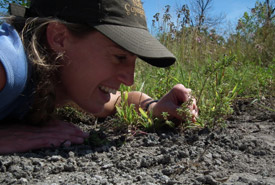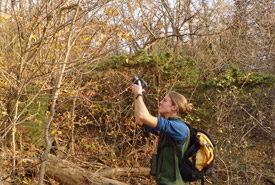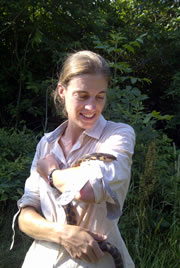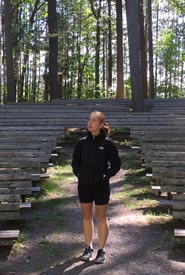Women in conservation: Mhairi McFarlane

Mhairi McFarlane with leucospora (Photo by NCC)
In honour of International Women’s Day (March 8), we’re celebrating eight female conservationists at the Nature Conservancy of Canada (NCC) who are working to create a stronger future for Canada’s landscapes.
For Mhairi McFarlane, her love for landscapes began across the pond. She and her family would take long trips driving from Scotland to England, and to pass the time Mhairi would flip through her parents' identification guides. She began to memorize the intricate diagrams adorning the tattered pages and was able to spot species in the wild. Her favourite of the bunch was the book on birds, sparking her lifelong interest in species of the United Kingdom and those here in Canada, where she currently resides and works for NCC.
Read our interview with Mhairi here:

Mhairi McFarlane, conservation science manager for Ontario, capturing the Lake Erie watersnake on film, Ontario (Photo by NCC)
RB: What did you study in school and where?
MM: I did an honour’s ecology degree at the University of Stirling in Scotland and my PhD at the University of Exeter, England, where I studied the behavioural ecology of Cape sugarbirds in South Africa.
RB: What was your first job in the environmental/conservation/science field? What did you learn in this position that has helped you now?
MM: My first real-life experience in this field was a three-week volunteer position at the Royal Society for the Protection of Birds Loch of Strathbeg Nature Reserve in Scotland. Grassland, or “farmland,” birds are declining in the UK, so many nature reserves use traditional farming practices to manage wet grasslands. I helped out with counting cattle and sheep to ensure that stocking rates were just right for the birds. It was one of my earlier direct experiences of the importance of habitat management and its effect on various species.
RB: Describe a typical day at NCC for you.
MM: Much of my days at NCC now involve processing emails. It may not sound very exciting, but it is very satisfying being able to learn more and more about what NCC does throughout Ontario and across Canada, and to be able to share my experiences to help further our conservation work.

Mhairi McFarlane (Photo by NCC)
RB: Tell me about a time you consider to be your “best moment in science.” This could be a moment you discovered something in nature, a moment you saw a species or something you learned about yourself.
MM: My favourite part of working with NCC is being able to see the results of our combined efforts on the ground. I have led or helped out with the restoration of former agricultural land on Pelee Island in Ontario for several years now, and watching monarch butterflies and thousands of bees flitting among the native flowers on the property I helped plant seeds on the previous year is an unbeatable feeling.
RB: Why is it important for women to be in science?
MM: Different people from different backgrounds and different places all have important things to bring to a given conservation challenge; the same is true of men and women.
What advice do you have for women looking to make a career in the science or, more specifically, the conservation field?
Work hard, take every opportunity available to you and try to create some opportunities for yourself as well. Learn how to sell your skills and strengths. Never assume that if you don’t understand or can’t do something it’s because you lack a skill or have a weakness. Ask questions, and work out how best to achieve whatever it is. I have found that many of the things I have been unable to do were because the instructions were vague or incomplete, so I’ve often tried to take the opportunity to fix the underlying problem.


